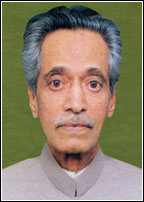
Man of principles
Altaf Hussain Asad: Dawn, October 10, 2006
Book Review: Jaaiza: Justice Samdani ki Khayal Angez Khudnavisht Sawaneh Umri
By Justice (Retd) Khwaja Muhammad Ahmad Samdani, Sang-e-Meel Publications.
A time tested adage goes like this: “Judges do not speak but their decisions do”. This is but partially true because at a certain time a judge too may speak up. And anyway, there should be no reason to keep mum after relinquishing the black gown. We have of late seen some members of the judiciary speaking their minds to set the record straight. The names of Sajjad Ali Shah and Ajmal Mian can be mentioned to prove our point. Now Justice (Retd) Khwaja Muhammad Ahmad Samdani, a fearless and upright member of the judiciary, has come up with his autobiography.
In Jaaiza he not only throws light on his family background but also other events he was privy to. Having the knack of getting the message across in a few words, the author sums it all up in just 103 pages. And in doing so he never tries to impress you with his erudition. Rather he presents the facts encouraging you to draw your own conclusions. This is what makes the book even more appealing.
Born in a middle class family in Kareem Nagar (Hyderabad Deccan) in 1932, Samdani received his early education from his native city where Urdu was the official parlance of the state. At the very outset he lavishly praises the educational standards of Hyderabad Deccan as the Nizams gave great importance to education.
Soon after Partition the family moved to Rawalpindi. Samdani taught for a while at the Islamia College, Peshawar before joining the civil service in 1954. But it seems that his heart was not in civil service as after only five years he decided to join the judiciary. It was not smooth sailing for a man of principles like him. He went through many difficulties. There are many anecdotes in the book that show how he does not believe in appeasing his superiors by going contrary to what service rules allow. One example may be of pertinent interest for the readers. While serving as the district and sessions judge in Sialkot, Samdani came to know of the arrival of the then Chief Justice A.R. Cornelius in Sialkot. The purpose of the visit was to inaugurate a dispensary. Since the visit was a private one, the author did not go to receive the chief justice. More amazing is the fact that the chief justice too did not mind the absence of the sessions judge on the eve of his visit. Such down to earth, honest individuals are hard to find these days.
Justice Samdani was appointed the additional judge of the Lahore High Court in 1972. He criticises the policy of the government to appoint additional judges for a certain period of time. In the author’s opinion, the biggest flaw in this policy is that the additional judges hesitate in giving verdicts against the government in order to get confirmation. He proposes to abolish this tradition, as it is very detrimental to the independence of the judiciary. However, the author’s litmus test came when the bail application of Zulifiqar Ali Bhutto appeared before his court. Bhutto had been charged with the murder of Nawab Muhammad Ahmad. Much to the dismay of Ziaul Haq, Samdani granted him bail.
Many years later, when he contested the elections for the president of the Lahore High Court Bar Association, a majority of the lawyers belonging to the Peoples Party rallied round him as they thought he had granted their leader bail. Samdani does not approve of politics in the cadres of lawyers and says that lawyers should not dance to the tunes of the various political parties. He also exhorts the Bar Councils that they should not award practice license to every Tom, Dick and Harry. Perhaps his firm belief in Sufism has made his inner self so strong that he never bows down before the powers that be.
In April 1980, when Samdani was working as federal law secretary, Ziaul Haq used derogatory language against the secretaries. Samdani could not keep mum as he too verbally attacked army men in the presence of General Zia. This created an embarrassing situation for the president’s cronies as they exerted their full pressure on Samdani to seek apology from Zia. But as he believed that he had done nothing wrong, he did not do so.
Justice Samdani said goodbye to the judiciary in 1981 as he refused to take a fresh oath which contained some unconstitutional clauses. He is a man who due to his principles has had to face many difficulties in life. The world needs more such dedicated and incorruptible judges.
3 comments:
A beam of light in complete darkness!
Afzaal
Thanks for sharing. God bless him.
Thanks for sharing. God bless him
Post a Comment